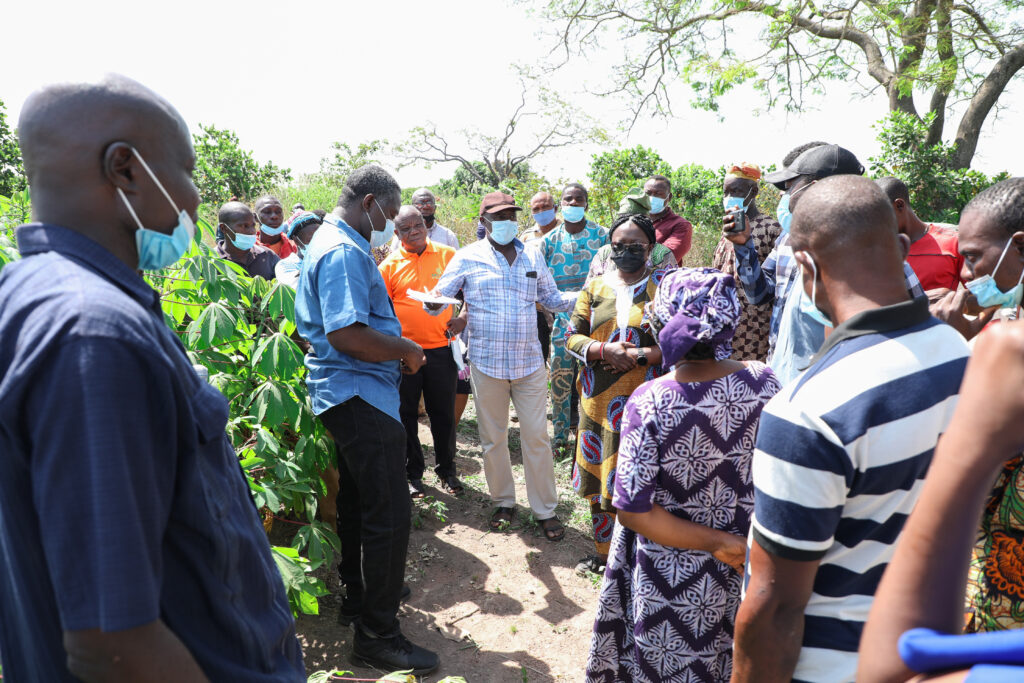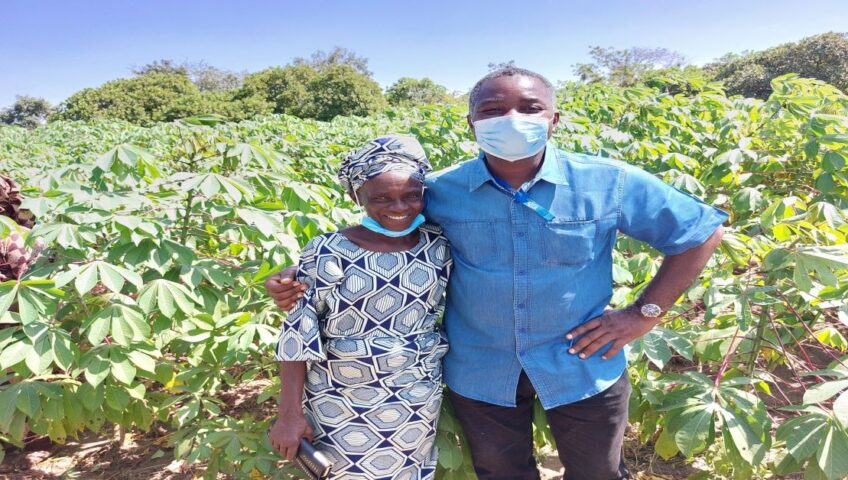Signs that more cassava farmers in Oyo State will adopt improved varieties in the new planting season have emerged from the testimonies of a farmer and cassava seed entrepreneur, Mrs Dorcas Alamu. Farmers around the 55-year-old woman are amazed at her cassava seed farm and willing to emulate her. She disclosed this recently when officials of the Federal Ministry of Agriculture and Rural Development, Oyo State Ministry of Agriculture and GIZ-GIAE Nigeria paid a monitoring visit to her farm at Gbana village, Ogbomoso, Oriire Local Government Area of the state.
Mrs Alamu is one of the 60 cassava seed entrepreneurs established by the cassava and maize value chain project implemented by the International Institute of Tropical Agriculture (IITA) with funding from Deutsche Gesellschaft für Internationale Zusammenarbeit (GIZ). Through its Green Innovation Centers for the Agriculture and Food Sector Program in Nigeria (GIAE), GIZ is funding the project to create more income opportunities for farmers with a special focus on women and youth to mitigate the economic impact of COVID-19 in the agricultural sector.
In Ogun and Oyo States, the GIZ-GIAE/IITA Cassava and Maize Value Chain Project has established 60 cassava seed entrepreneurs as part of efforts to build resilience in the seed sector and create additional income and job opportunities for smallholder farmers.
The delegation, which comprised officials of the Federal Ministry of Agriculture and Rural Development, Oyo State Ministry of Agriculture, Ogun State Cassava Revolution Program and GIZ-GIAE Nigeria expressed satisfaction at Mrs Alamu’s farm which showed the qualities of improved cassava varieties.

During an interactive session with the visitors, Mrs Alamu said: “When we came to IITA for training, we saw the advantages of planting improved varieties. They introduced us to the business of producing and selling certified cassava stems of improved varieties. With what you can see on the field now, you can be sure that the harvest would be a bumper one, and there would be enough cassava stems of the improved varieties for sale.
“One interesting thing is that since I planted in May, I have only weeded once. In the past, I would have weeded about three times. Apart from learning about the cassava seed system, we also learnt about effective weed management. And IITA supported us technically during planting. So I am glad I ventured into this business, and I am so excited with the farm which is looking fresh and healthy. Look around; there is no field like mine in this area. I want to use this opportunity to call on fellow farmers who are yet to plant this cassava variety to please give it a try, and I am very sure they won’t regret doing so.”
Mrs Alamu planted the variety named ‘Dixon,’ with a yield potential of at least 30 tons and above. However, close to Mrs Alamu’s farm are local varieties that offer farmers less than 10 tons per ha and most of them are susceptible to diseases.
“I will sell this improved cassava variety to fellow farmers and increase my cassava seed farm,” Mrs Alamu said.
In her remarks, the leader of the FMARD delegation, Dr Ngozi Odunze, explained that the visit was to assess the progress of the project, ensure that the implementation was according to plan, and seek areas of adjustments.
“I am happy with the level of progress. I am satisfied that even when the project elapses, farmers will continue to get improved planting materials.”
Speaking on the approach IITA adopted, the Project Manager, Dr. Godwin Atser, pointed out that the project was creating job and income opportunities for farmers and young people while at the same time establishing a sustainable seed system for cassava using the BASICS Model. He said the model was developed by another IITA project named, Building an Economically Sustainable Integrated Cassava Seed System (BASICS-II) and the farmers bought their stems from IITA GoSeed.
The cassava value chain advisor for GIAE Nigeria, Dr. Abidemi Ajibola said the project was one of the COVID-19 measures to improve productivity, livelihood opportunities, especially for the youth and women and contribute to food and nutritional security.
While welcoming the visitors, the traditional ruler of the community, Elero of Pamoland, Oba Ayobami Ogunmakinde, represented by the Agbaakin of Orile Pamo, Chief Timothy Oyewusi, expressed delight at seeing the visitors, with a plea to extend the project to more farmers.
The traditional ruler also used the opportunity of the gathering to call on farmers to jettison the old ways of doing farming and embrace new technologies and techniques.

